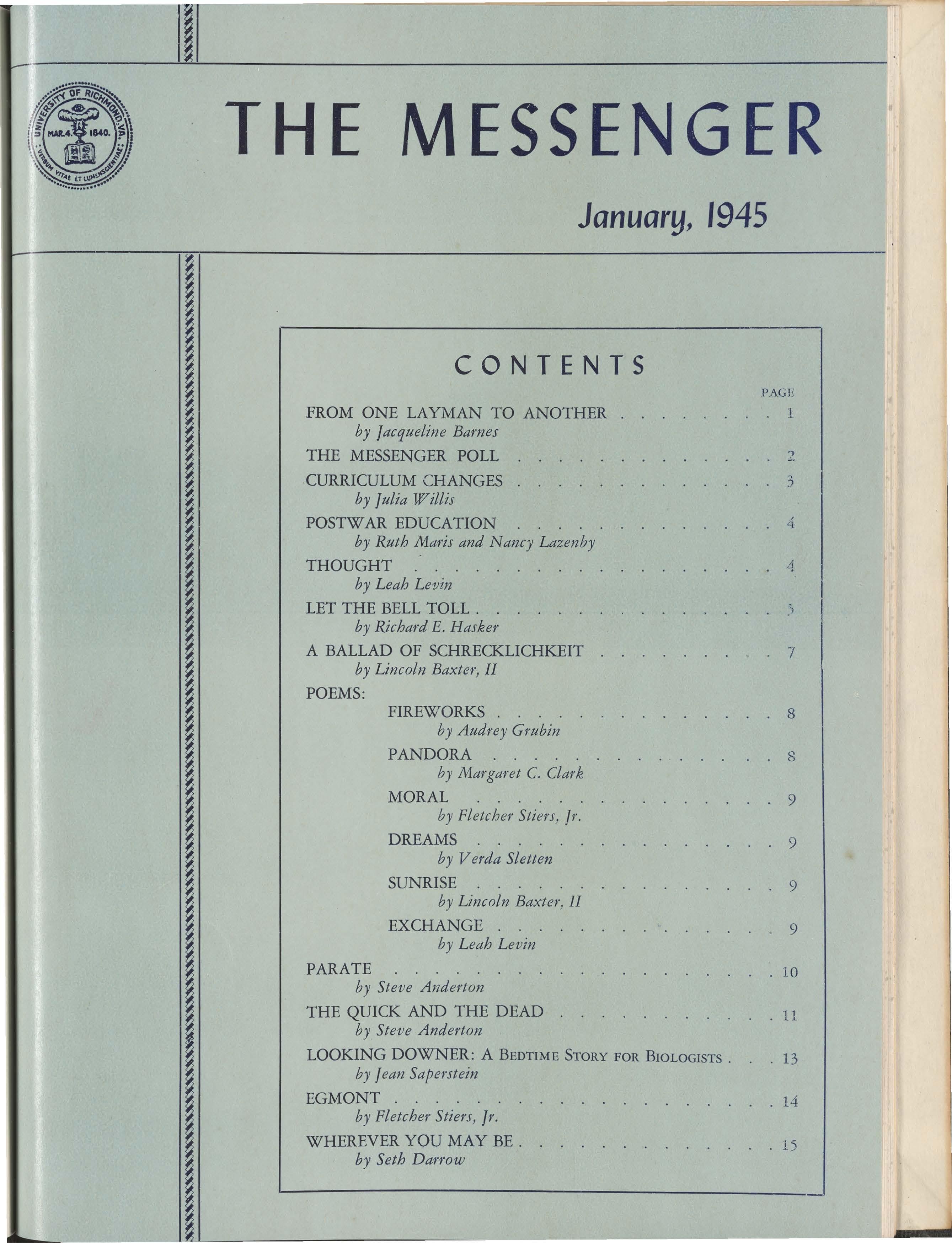

THE MESSENGER
THE MESSENGER 1
UNIVERSITY OF RICHMOND VOLUME -I::11 NUMBER 2
Editor-in-Chief
JULIAS. WILLIS
Richmond College Editor
RICHARD HASKER
Richmond College Staff
ANDREW SULLIVAN
FLETCHER STIERS, JR.
Westhampton College Editor
JEAN SAPERSTEIN
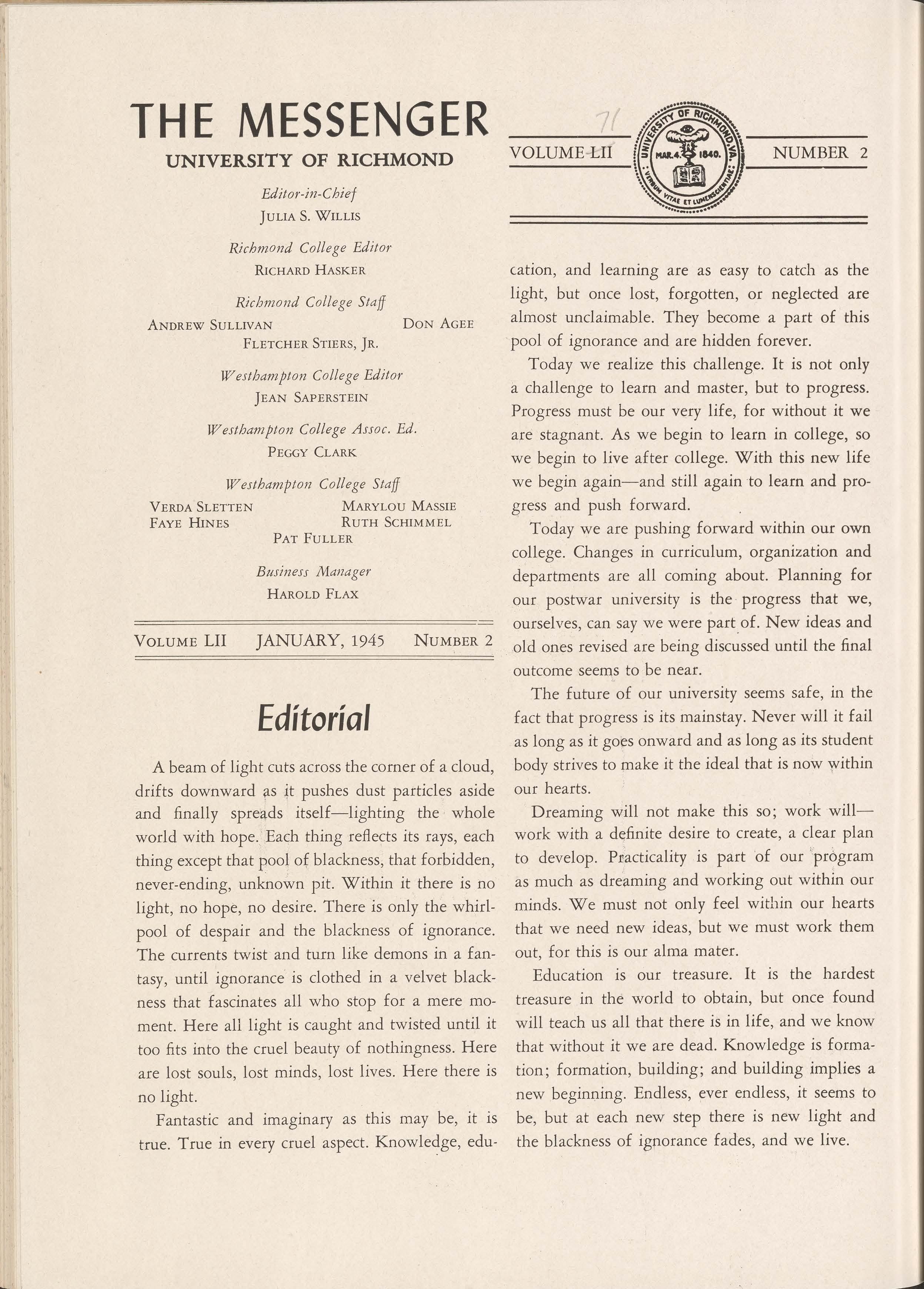
DON AGEE
Westhampton College Assoc. Ed.
PEGGY CLARK
Westhampton College Staff
VERDA SLETTEN
FAYE HINES
MARYLOU MASSIE
RUTH SCHIMMEL
PAT FULLER
Business Manager
HAROLD FLAX
VOLUME LII
JANUARY, 1945
Editorial
NUMBER 2
cation, and learning are as easy to catch as the light, but once lost, forgotten, or neglected are almost unclaimable. They become a part of this pool of ignorance and are hidden forever.
Today we realize this challenge. It is not only a challenge to learn and master, but to progress. Progress must be our very life, for without it we are stagnant. As we begin to learn in college, so we begin to live after college. With this new life we begin again-and still again to learn and progress and push forward.
Today we are pushing forward within our own college. Changes in curriculum, organization and departments are all coming about. Planning for our postwar university is the progress that we, ourselves, can say we were part_of. New ideas and old ones revised are being discussed until the final outcome seems to be near.
A beam of light cuts across the corner of a cloud, drifts downward iJ.S~t pushes dust particles aside and finally spreads itself-lighting the whole world with hope. Each thing reflects its rays, each thing except that pool 0£blackness, that forbidden, never-ending, unknown pit. Within it there is no light, no hope, no desire. There is only the whirlpool of despair and the blackness of ignorance. The currents twist and tum like demons in a fantasy, until ignorance is clothed in a velvet blackness that fascinates all who stop for a mere moment. Here all light is caught and twisted until it too fits into the cruel beauty of nothingness. Here are lost souls, lost minds, lost lives. Here there is no light.
Fantastic and imaginary as this may be, it is true. True in every cruel aspect. Knowledge, edu-
The future of our university seems safe, in the fact that progress is its mainstay. Never will it fail as long as it goes onward and as long as its student body strives to make it the ideal that is now ~ithin our hearts.
Dreaming will not make this so; work willwork with a definite desire to create, a clear plan to develop. Practicality is part of our ' program as much as dreaming and working out within our minds. We must not only feel within our hearts that we need new ideas, but we must work them out, for this is our alma mater.
Education is our treasure. It is the hardest treasure in the world to obtain, but once found will teach us all that there is in life, and we know that without it we are dead. Knowledge is formation; formation, b4ilding; and building implies a new beginning. Endless, ever endless, it seems to be, but at each new step there is new light and the blackness of igµorance fades, and we live.

TFromOne Laymanto Another
By JACQUELINE BARNES
HE erudite scholar may gaily peruse his way down the bosky path between the bookshelves, but to the average reader the crammed cases form an impenetrable maze.
The layman is not omnivorous; his problem is not one of engirding all literature, but rather of selection of what he will enjoy. To read for improvement is worthy indeed and there are those who assert that to read for pleasure and to read for improvement are identical. Not so I. The pundits may choose to curl up with Spinoza's Ethics but I'll take almost anything else. Here lies the crux of the matter-the authorities chosen and who you are. Much of the fiction and non-fiction, past and present, is more arid than the Sahara Desert. Many of the most worthwhile books (and I have no doubt but that they are) can be read only by college professors, Mortimer "How to Read a Book" Adler notwithstanding. On the other hand, many books that the experts never mention or consider taking off the shelves have ingredients of hours of delight.
Today murder mysteries are in good repute. It is no longer socially degrading to say that one enjoys them The sages, having finally decided to read them, of course announce that only certain ones are acceptable and proceed to choose tomes like The Moonstone , Murders in the Rue Morgue and the ilk. These efforts of Collins and Poe were two of the tirst mysteries and, with that kept in mind, are not bad, but in my mind they do not compare with the output of any standard modern murder mystery writers like Mary Roberts Rinehart, Mignon Eberhardt, S. S. Van Dine, Nero Wolf and many others.
There is another arena which offers as great excitement, quite as much blood and which should not be by-passed in the search for an evening entertainment. The Greek tragedies are as violent as one might wish, with Euripidies and Aeschyles leading the field. They easily hold their own with O'Neill, Anderson and Hellman. Plays in o-eneral sustain a high degree of interest.
b The novel offers endless possibilities with as many divisions of style, technique and content. l venture to name a few from which I have derived the greatest enjoyment and satisfaction-none requiring either hatchet or dictionary. The one which
has recently made the greatest impression is Freedom Road by Howard Fast, which brings to my mind Up From Slavery by Booker T. Washington. The two are similar in that each presents a picture of the Negro which gives one hope for the future -if the white man is sufficiently intelligent.
It seems to me that the best-sellers of today are inferior to those of a few years ago: My Son, my Son,- Gone With the Wind,· T 1he Mortal Storm,How Green Was My Valley. Can one place in juxtaposition with these a product of wartime frustration like Forever Amber by Kathleen Winsor? Shall we consider even an unconscious pandering to noxious sensationalism like Strange Fruit by Lillian Smith?
The sole exceptions are today's war novels, which are amazingly uniform in excellence. A Bell for Adana by John Hersey is one of the most acclaimed and justly so. The non-fiction on the war is intensely stirring and even better reading. In peacetime it has seemed to me that only the Scandinavians and the Russians approach this level. Katrina by Sally Salimen and The Seven Who Were Hanged by Anderev are of this ilk.
Psychological novels today are being turned out en masse. One of the best is The Progress of Julius by DuMaurier, which incidentally is better than either Rebecca or Jamaica Inn.
Historical novels are legion, some of the best being I, Claudius by Robert Graves, And So, Victoria by Litton Strachey , Powers by Feuchtwanger, and Oliver Wiswell by Kenneth Roberts.
Other books which should not be missed if your taste is similar to mine are The Growth of the Soil by Hamsun, Point Counterpoint by Huxley, Look Homeward Angel by T. Wolfe and, i Harie Antoinette by ZV(eig and Coronet by Komroff.
Perhaps it has come to your attention that it is easier to remember past books than present. For example, The Sun is My Undoing compares rather favorably with Anthony Adverse in adventure material, but already is almost forgotten in the mind of the public. Because of the prodigious output of reading material, books are losing their individuality and people are losing their sense of discrimination. Of Human Bondage, as widely read today (Continued o n page 15)
[ 1 ]
THE·MESSENGERPOLL

1. Do you like the present system of major requirements?
2 Do required courses for a major restrict you from taking many other courses that interest you?
3. Do you think music appreciation or art appreciation should be made required courses for all students?
4. Do you think that economics, business administration and other majors now open only to Richmond College should be extended to We~thampton?
5. Does the present grading system show you where you stand in relation to your fellow students and the body of knowledge presented in a course? .
6. Would you prefer to be graded merely, "satisfactory" or "unsatisfactory" ?
7 . Would you like to see a "reading period" introduced into the senior year for the purpose of work on a senior thesis? (This reading period would be a period of a few weeks without classes and not necessarily spent on the campus.)
8. Does the plan of a period in the senior year taken away from college in which you get a job or do experimentation in your major field interest you?
9 . Do you think there is enough individual work done in the senior year on a major?
10. Would you prefer to work during your senior year without lectures in the major but with weekly conferences with a professor in your major field?
11. Do you pref er classes of student participation to lecture classes?
12 . Would you like lectures given in outline for the first part of a class with discussion by and with the professor during the latter part?
13. Do you think students need a course in the "philosophy" of their major to show them the intercorellation of their varied courses ?
14. Do you think lectures should be given freshmen to present the extent and opportunities of various fields of study to prepare them to choose a major?
[ 2 ]
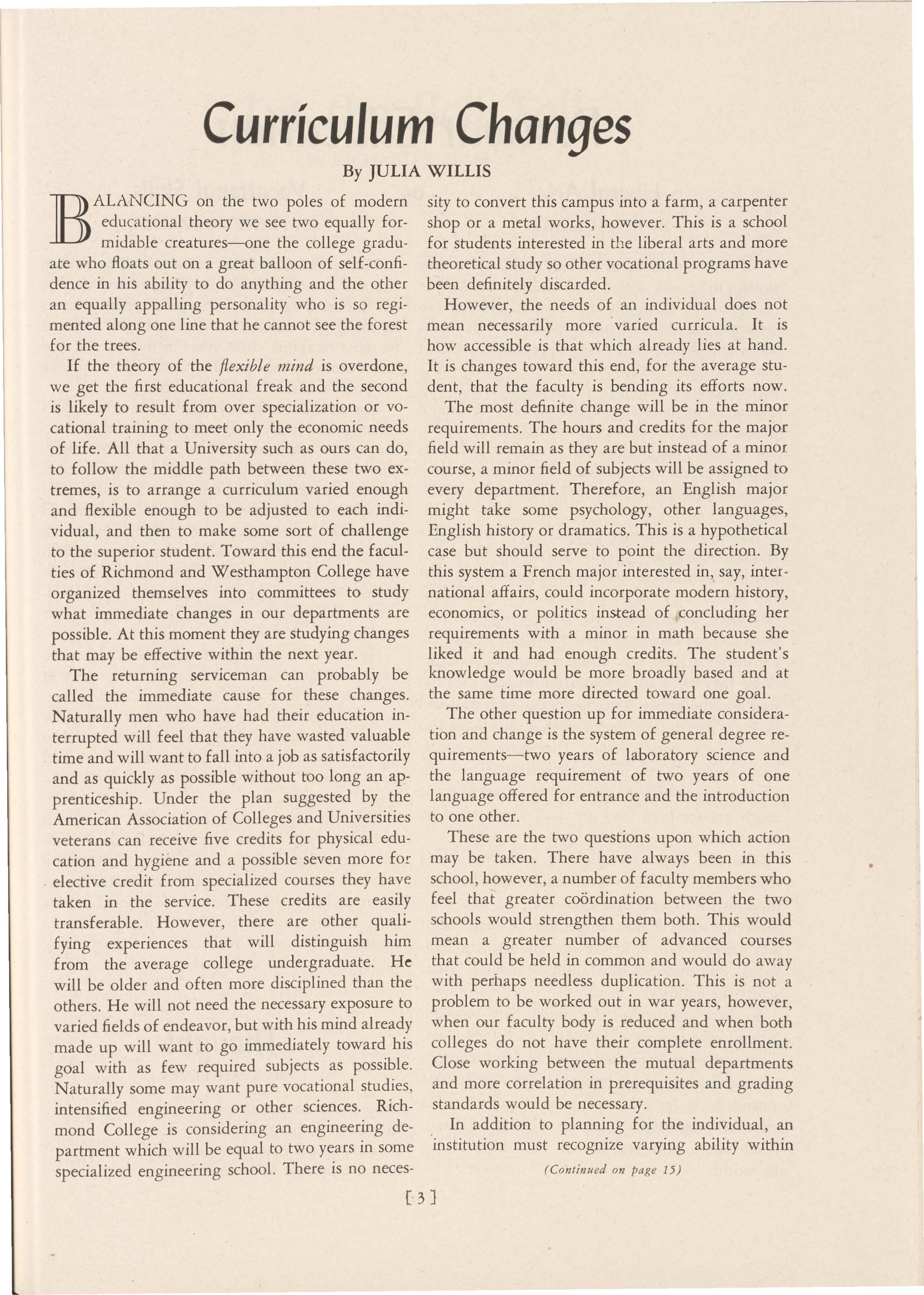
CurriculumChanges
By JULIA WILLIS
BALANCING on the two poles of modern educational theory we see two equally formidable creatures-one the college graduate who floats out on a great balloon of self-confidence in his ability to do anything and the other an equally appalling personality who is so regimented along one line that he cannot see the forest for the trees.
If the theory of the fiexible mind is overdone, we get the first educational freak and the second is likely to result from over specialization or vocational training to meet only the economic needs of life. All that a University such as ours can do, to follow the middle path between these two extremes, is to arrange a curriculum varied enough and flexible enough to be adjusted to each individual, and then to make some sort of challenge to the superior student. Toward this end the faculties of Richmond and Westhampton College have organized themselves into committees to study what immediate changes in our departments are possible. At this moment they are studying changes that may be effective within the next year.
The returning serviceman can probably be called the immediate cause for these changes. Naturally men who have had their education interrupted will feel that they have wasted valuable time and will want to fall into a job as satisfactorily and as quickly as possible without too long an apprenticeship. Under the plan suggested by the American Association of Colleges and Universities veterans can receive five credits for physical education and hygiene and a possible seven more foe elective credit from specialized courses they have taken in the service. These credits are easily transferable. However, there are other qualifying experiences that will distinguish him from the average college undergraduate. He will be older and often more disciplined than the others. He will not need the necessary exposure to varied fields of endeavor, but with his mind already made up will want to go immediately toward his goal with as few required subjects as possible. Naturally some may want pure vocational studies, intensified engineering or other sciences. Richmond College is considering an engineering department which will be equal to two years in some specialized engineering school. There is no neces-
sity to convert this campus into a farm, a carpenter shop or a metal works, however. This is a school for students interested in the liberal arts and more theoretical study so other vocational programs have been definitely discarded.
However, the needs of an individual does not mean necessarily more ·varied curricula . It is how accessible is that which already lies at hand. It is changes toward this end, for the average student, that the faculty is bending its efforts now.
The most definite change will be in the minor requirements. The hours and credits for the major field will remain as they are but instead of a minor course, a minor field of subjects will be assigned to every department. Therefore, an English major might take some psychology, other languages, English history or dramatics. This is a hypothetical case but should serve to point the direction. By this system a French major interested in, say, international affairs, could incorporate modern history , economics, or politics instead of concluding her requirements with a minor in math because she liked it and had enough credits. The student's knowledge would be more broadly based and at the same time more directed toward one goal.
The other question up for immediate consideration and change is the system of general degree requirements-two years of laboratory science and the language requirement of two years of one language offered for entrance and the introduction to one other.
These are the two questions upon which action may be taken. There have always been in this school , however , a number of faculty members who feel that greater coordination between the two schools would strengthen them both. This would mean a greater number of advanced courses that could be held in common and would do away with perhaps needless duplication. This is not a problem to be worked out in war years, however, when our faculty body is reduced and when both colleges do not have their complete enrollment. Close working between the mutual departments and more correlation in prerequisites and grading standards would be necessary.
In addition to planning for the individual, an institution must recognize varying ability within ( Con t in ued on p age 15)
[ 3]
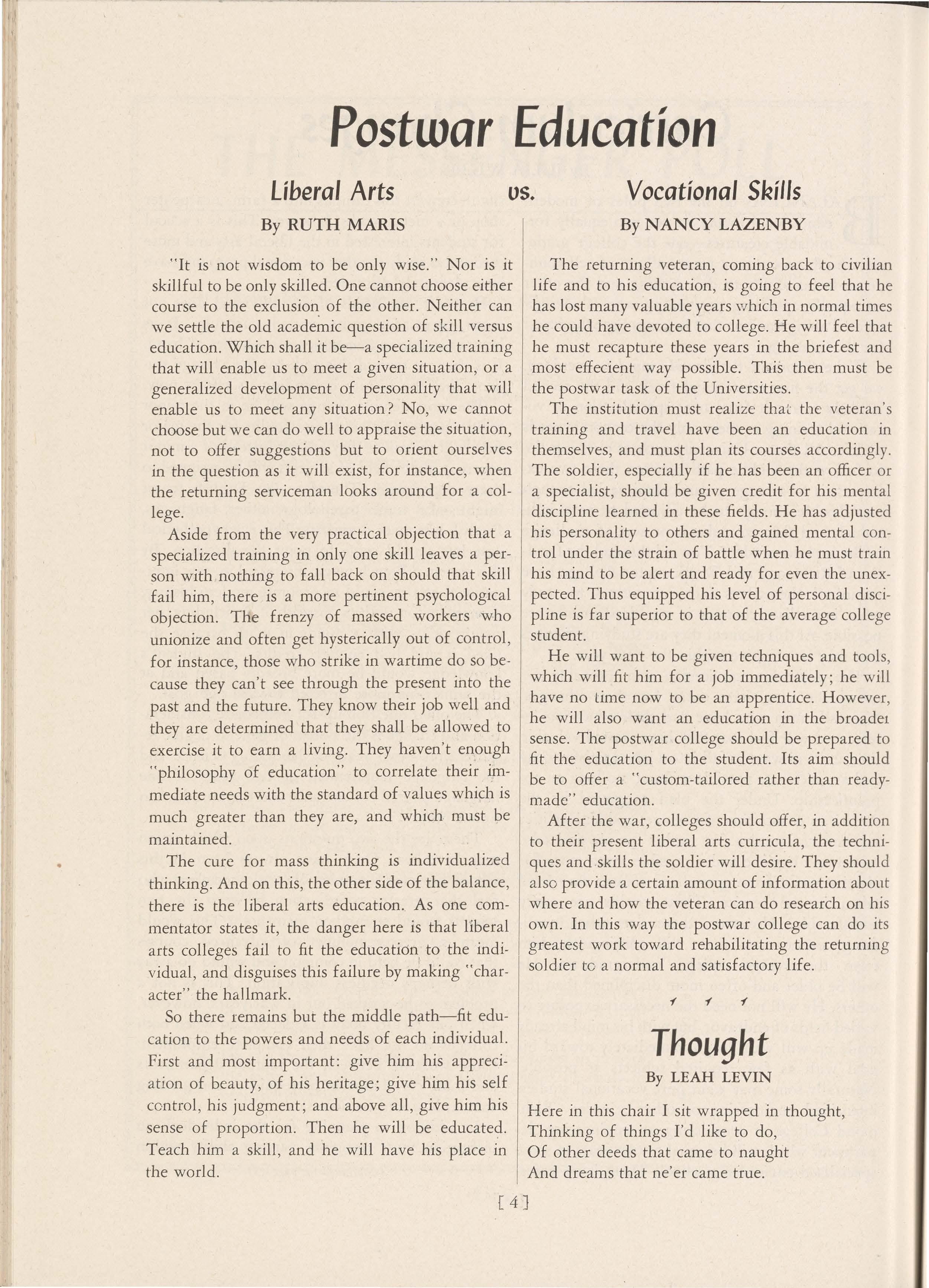
PostwarEducation
LiberalArts
By RUTH MARIS
"It is not wisdom to be only wise." Nor is it skillful to be only skilled. One cannot choose either course to the exclusion of the other. Neither can we settle the old academic question of skill versus education. Which shall it be-a specialized training that will enable us to meet a given situation, or a generalized development of personality that will enable us to meet any situation? No, we cannot choose but we can do well to appraise the situation , not to offer suggestions but to orient ourselves in the question as it will exist, for instance , when the returning serviceman looks around for a college.
Aside from the very practical objection that a specialized training in only one skill leaves a person with nothing to fall back on should that skill fail him, there is a more pertinent psychological objection. The frenzy of massed workers who unionize and often get hysterically out of control, for instance, those who strike in wartime do so because they can't see through the present into the past and the future. They know their job well and they are determined that they shall be allowed to exercise it to earn a living. They haven ' t enough "philosophy of education" to correlate their immediate needs with the standard of values which is much greater than they are, and which must be maintained.
The cure for mass thinking is individualized thinking. And on this, the other side of the balance , there is the liberal arts education As one commentator states it, the danger here is that liberal arts colleges fail to fit the education , to the individual, and disguises this failure by ~aking "character " the hallmark.
So there remains but the middle path-fit education to tht powers and needs of each individual . First and most important: give him his appreciation of beauty, of his heritage; give him his self central , his judgment; and above all, give him his sense of proportion. Then he will be educated . Teach him a skill, and he will have his place in the world.
us. VocationalSkills
By NANCY LAZENBY
The returning veteran, coming back to civilian life and to his education, is going to feel that he has lost many valuable years which in normal times he could have devoted to college. He will feel that he must recapture these years in the briefest and most effecient way possible. This then must be the postwar task of the Universities.
The institution must reali ze that the veteran 's training and travel have been an education in themselves , and must plan its courses accordingly The soldier , especially if he has been an officer or a specialist, should be given credit for his mental discipline learned in these fields. He has adjusted his personality to others and gained mental control under the strain of battle when he must train his mind to be alert and ready for even the unexpected. Thus equipped his level of personal discipline is far superior to that of the average colle g e student.
He will want to be given techniques and tools , which will fit him for a job immediately ; he will have no lime now to be an apprentice. However , he will also want an education in the broade 1 sense. The postwar college should be prepared to fit the education to the student. Its aim should be to offer a " custom-tailored rather than readymadc" education.
After the war , colleges should offer , in addition to their present liberal arts curricula, the techniques and skills the soldier will desire. They shoul d als o provide a certain amount of information about where and how the veteran can do research on hi s own. In this way the postwar college can do it s greatest work toward rehabilitating the returnin g soldier to a normal and satisfactory life . f f f
Thought
By LEAH LEVIN
Here in this chair I sit wrapped in thought, Thinking of things I'd like to do, Of other deeds that came to naught And dreams that ne'er came true.
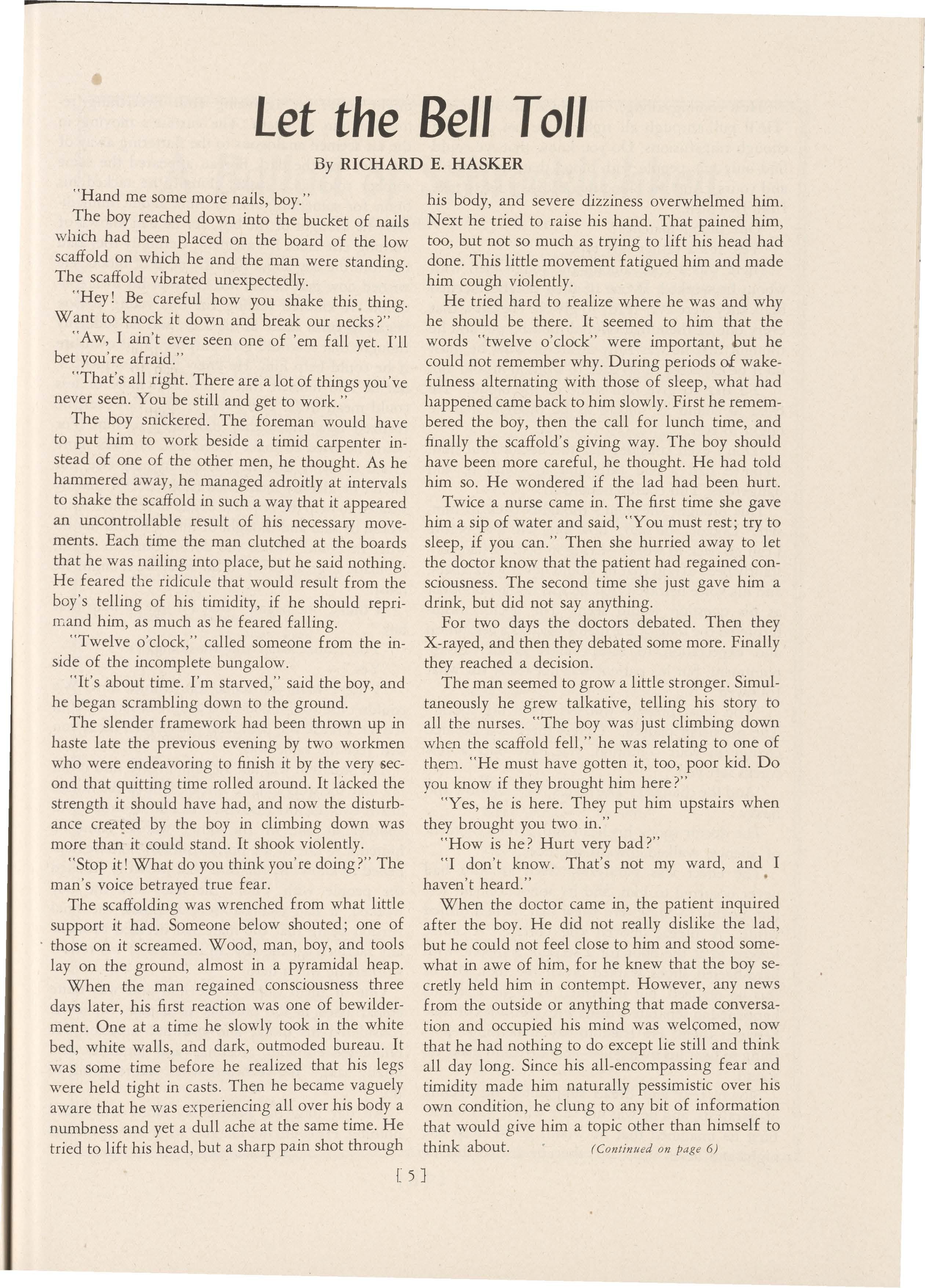
Letthe BellToll
By RICHARD E. HASKER
" Hand me some more nails, boy."
The boy reached down into the bucket of nails w hich had been placed on the board of the low scaffold on which he and the man were standing . The scaffold vibrated unexpectedly.
" Hey! Be careful how you shake this thing. Want to knock it down and break our necks? "
" Aw , I ain ' t ever seen one of 'em fall yet. I'll bet you're afraid. "
" That's all right. There are a lot of things you ' ve never seen. You be still and get to work. "
The boy snickered The foreman would have t o put him to work beside a timid carpenter instead of one of the other men, he thought. As he hammered away , he managed adroitly at intervals to shake the scaffold in such a way that it appeared a n uncontrollable result of his necessary movements . Each time the man clutched at the boards that he was nailing into place, but he said nothing He feared the ridicule that would result from the boy ' s telling of his timidity, if he should repriffiand him , as much as he feared falling .
" Twelve o ' clock ," called someone from the inside of the inco mplete bungalow.
"It's about time . I'm starved, " said the boy, and he began scrambling down to the ground.
The slender framework had been thrown up in h a ste late the previ o us evening by two workmen who were ende avoring to finish it by the very second that quitting time rolled around. It lacked the strength it should have had, and now the disturbance crea~ed by the boy in climbing down was more than it could stand. It shook violently.
" Stop it! What do you think you ' re doing? " The man ' s voice betrayed true fear.
The scaffolding was wrenched from what little support it had . Someone below shouted; one of · those on it screamed. Wo o d , man , boy , and tools la y on the ground , almost in a pyramidal heap
When the man regained consciousness three days later, his first reaction was one of bewilderment. One at a time he slowly took in the white bed , white walls, and dark, outmoded bureau. It was some time before he realized that his legs were held tight in casts Then he became vaguely aware that he was ex periencing all over his body a numbness and yet a dull ache at the same time. He tried to lift his head , but a sharp pain shot through
his body, and severe dizziness overwhelmed him Next he tried to raise his hand. That pained him , too , but not so much as trying to lift his head had done . This little movement fatigued him and made him cough violently.
He tried hard to realize where he was and why he should be there. It seemed to him that the words "twelve o ' clock" were important, but he could not remember why. During periods o.f wakefulness alternating with those of sleep, what had happened came back to him slowly. First he remembered the boy, then the call for lunch time, and finally the scaffold's giving way. The boy should have been more careful , he thought. He had told him so . He wondered if the lad had been hurt.
Twice a nurse came in. The first time she gave him a sip of water and said, "You must rest; try to sleep, if you can " Then she hurried away to let the doctor know that the patient had regained consciousness. The second time she just gave him a drink, but did not say anything .
For two days the doctors debated Then they X-rayed, and then they debated some more Finally they reached a decision.
The man seemed to grow a little stronger. Simultaneously he g r ew talkative, telling his story to all the nurses " The boy was just climbing down when the scaffold fell," he was relating to one of th em. "He must have gotten it , too, poor kid. Do you know if they brought him here? "
" Yes , he is here. They put him upstairs when they brought you two in ."
"How is he? Hurt very bad?"
" I don ' t know That's not my ward , and I haven 't heard. " •
When the doctor came in , the patient inquired after the boy. He did not really dislike the lad , but he could not feel close to him and stood somewhat in awe of him, for he knew that the boy secretly held him in contempt. However, any news from the outside or anything that made conversation and occupied his mind was welcomed, now that he had nothing to do except lie still and think all day long Since his all-encompassing fear and timidity made him naturally pessimistic over his own condition, he clung to any bit of information that would give him a topic other than himself to think about. ( Continued on page 6) L 5 J
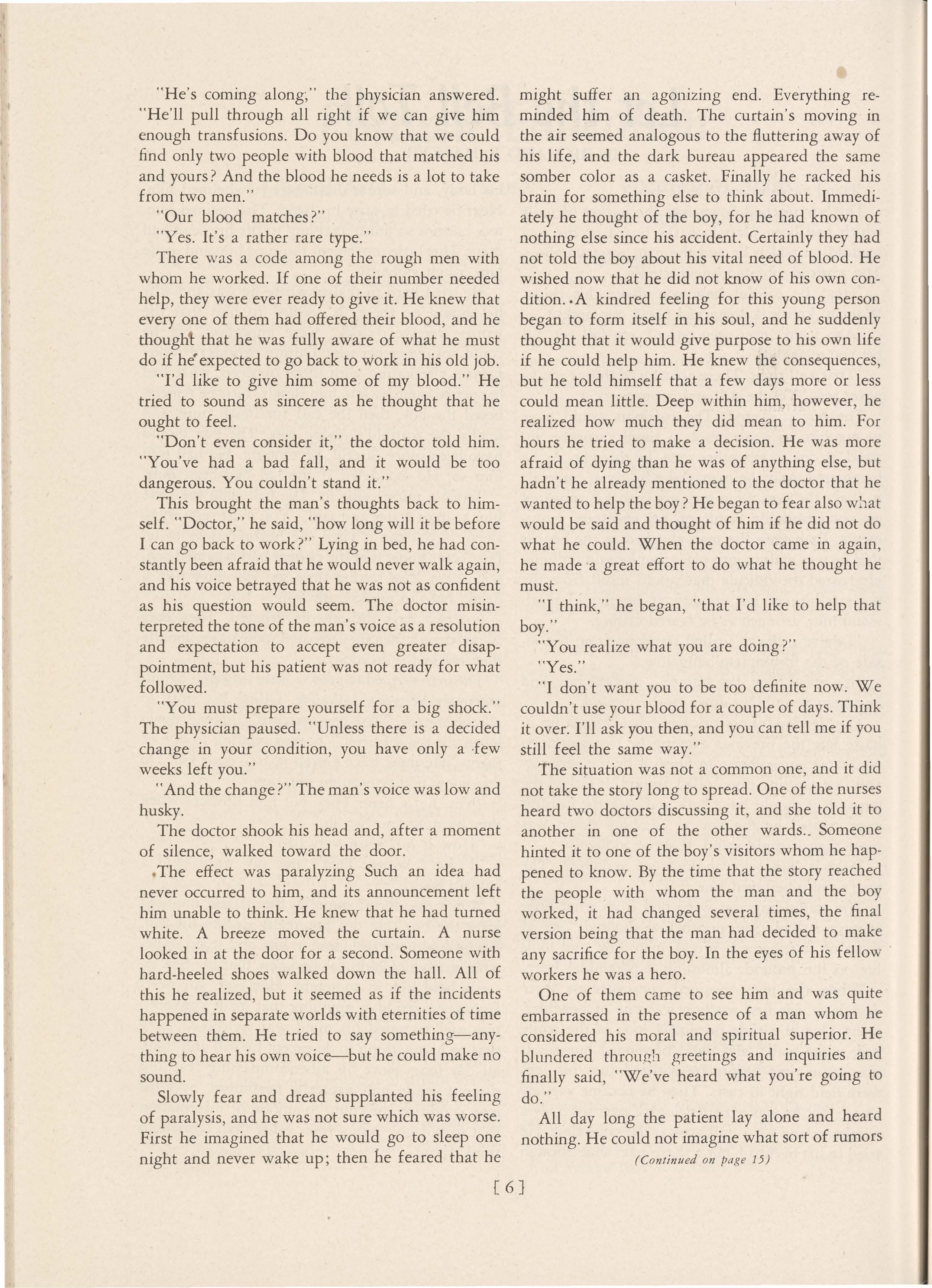
"He's coming along;" the physician answered. "He'll pull through all right if we can give him enough transfusions. Do you know that we could find only two people with blood that matched his and yours? And the blood he needs is a lot to take from two men."
"Our blood matches?"
"Yes. It's a rather rare type."
There was a code among the rough men with whom he worked. If one of their number needed help, they were ever ready to give it. He knew that every one of them had offered their blood, and he though that he was fully aware of what he must do if he expected to go back to work in his old job.
"I'd like to give him some of my blood." He tried to sound as sincere as he thought that he ought to feel.
"Don't even consider it," the doctor told him. "You've had a bad fall, and it would be too dangerous. You couldn't stand it."
This brought the man's thoughts back to himself. "Doctor," he said, "how long will it be before I can go back to work?" Lying in bed, he had constantly been afraid that he would never walk again, and his voice betrayed that he was not as confident as his question would seem. The doctor misinterpreted the tone of the man's voice as a resolution and expectation to accept even greater disappointment, but his patient was not ready for what followed.
"You must prepare yourself for a big shock." The physician paused. "Unless there is a decided change in your condition, you have only a -few weeks left you."
"And the change?" The man's voice was low and husky.
The doctor shook his head and, after a moment of silence, walked toward the door.
The effect was paralyzing Such an idea had never occurred to him, and its announcement left him unable to think. He knew that he had turned white. A breeze moved the curtain. A nurse looked in at the door for a second. Someone with hard-heeled shoes walked down the hall. All of this he realized, but it seemed as if the incidents happened in separate worlds with eternities of time between them. He tried to say something-anything to hear his own voice--but he could make no sound.
Slowly fear and dread supplanted his feeling of paralysis, and he was not sure which was worse. First he imagined that he would go to sleep one night and never wake up; then he feared that he
[ 6]
might suffer an agonmng end. Everything reminded him of death. The curtain's moving in the air seemed analogous to the fluttering away of his life, and the dark bureau appeared the same somber color as a casket. Finally he racked his brain for something else to think about. Immediately he thought of the boy, for he had known of nothing else since his accident. Certainly they had not told the boy about his vital need of blood. He wished now that he did not know of his own condition A kindred feeling for this young person began to form itself in his soul, and he suddenly thought that it would give purpose to his own life if he could help him. He knew the consequences, but he told himself that a few days more or less could mean little. Deep within him, however, he realized how much they did mean to him. For hours he tried to make a decision. He was more afraid of dying than he was of anything else, but hadn't he already mentioned to the doctor that he wanted to help the boy? He began to fear also wl1at would be said and thought of him if he did not do what he could. When the doctor came in again, he made a great effort to do what he thought he must.
"I think," he began, "that I'd like to help that boy."
"You realize what you are doing?"
"Yes."
"I don't want you to be too definite now. We couldn't use your blood for a couple of days. Think it over. I'll ask you then, and you can tell me if you still feel the same way."
The situation was not a common one, and it did not take the story long to spread. One of the nurses heard two doctors discussing it, and she told it to another in one of the other wards Someone hinted it to one of the boy's visitors whom he happened to know. By the time that the story reached the people with whom the man and the boy worked, it had changed several times, the final version being that the man had decided to make any sacrifice for the boy. In the eyes of his fellow · workers he was a hero.
One of them came to see him and was quite embarrassed in the presence of a man whom he considered his moral and spiritual superior. He bl nndered thrm1(;h greetings and inquiries and finally said, "We've heard what you' re going to d " 0.
All day long the patient lay alone and heard nothing. He could not imagine what sort of rumors
(Continued on page 15)
A Balladof Schrecklichkeit
By LINCOLN BAXTER, II
I sing a song of treachery, Of murder, hate, and greedThe properties of all the fiends Who hold the Nazi creed.
As swift as light on wings of thought, I crossed the heaving main.
I saw the tyrant's bloody sword
Uplifted o'er the slain .
I saw the droning airplane come, The great black birds of death. I saw the flaming, bursting bombs Crush out the children's breath.
Upon a field in sunny France, I checked my headlong flight.
I saw a pretty country maid; Her face was all alight.
She wore a simple peasant dress, A blossom in her hair.
She tripped across the grassy field, And sang a joyous air.
" Pierre is coming back today, Back with the soldier men.
Pierre is coming back today, I' II see him once again."
A tiny speck hi_gh in the sky, The striking vulture fell,
A plunging black and crimson plane , A messenger from hell.
My frantic cry, as in wild dreams, Was stifled in my throat.
The droning of a thousand bees
Cut short her lovely note.
The French girl stood, her head thrown back, Her hair a raven flag.
The killer was a Nazi dog, And murder was his brag.
The rattle of the guns began. I heard the bullets thud.
The brave lass turned, but from her side Was spurting scarlet blood.
Oh ghastly sight! I shook with rage.
The girl dropped to her knees
Around her form the pasture grass Was whipped as by a breeze.
The killer turned in one wild zoom, And whistled toward the sky
And he whirled his plane and plungedAgain he hurtled by
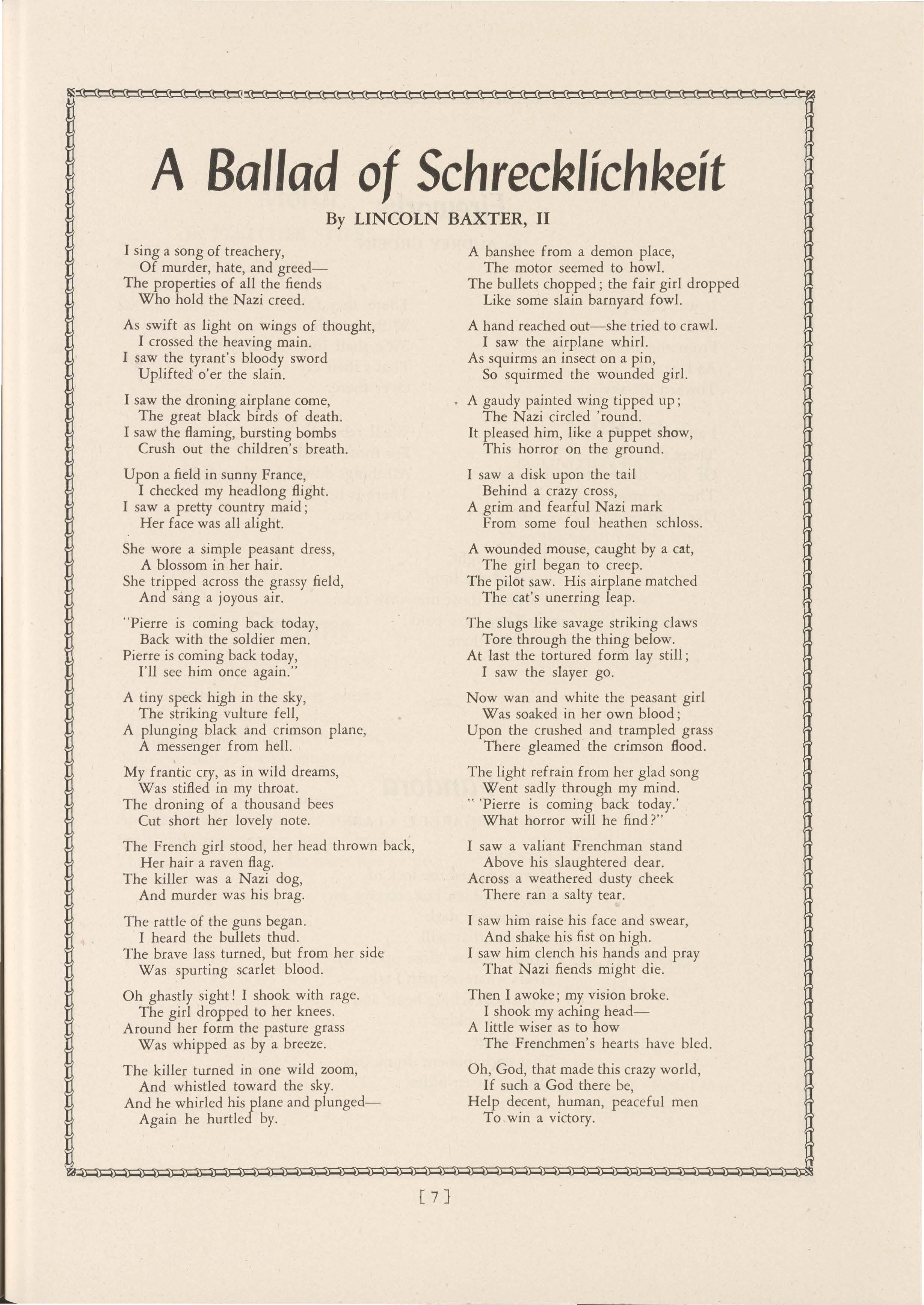
A banshee from a demon place, The motor seemed to howl. The bullets chopped; the fair girl dropped Like some slain barnyard fowl.
A hand reached out-she tried to crawl. I saw the airplane whirl.
As squirms an insect on a pin, So squirmed the wounded girl.
A gaudy painted wing tipped up; The Nazi circled 'round. It pleased him, like a puppet show, This horror on the ground
I saw a disk upon the tail Behind a crazy cross, A grim and fearful Nazi mark From some foul heathen schloss.
A wounded mouse, caught by a cat, The girl began to creep.
The pilot saw. His airplane matched The cat's unerring leap
The slugs like savage striking claws Tore through the thing below.
At last the tortured form lay still; I saw the slayer go.
Now wan and white the peasant girl Was soaked in her own blood ; Upon the crushed and trampled grass There gleamed the crimson flood
The light refrain from her glad song Went sadly through my mind.
" 'Pierre is coming back today.' What horror will he find?"
I saw a valiant Frenchman stand Above his slaughtered dear. Across a weathered dusty cheek There ran a salty tear.
I saw him raise his face and swear, And shake his fist on high.
I saw him clench his hands and pray That Nazi fiends might die.
Then I awoke; my vision broke. I shook my aching head-
A little wiser as to how
The Frenchmen's hearts have bled.
Oh, God, that made this crazy world, If such a God there be, Help decent, human, peaceful men To win a victory.
Fireworks
By AUDREY GRUBIN
It was night, And the light
There, they fall With the call, From the fireworks blazed As I gazed "We shall live!" as they die. That's their cry Toward the sky.
I am here. There's no fear Over there. We'll rebuild For those killed Of slow death from this noiseThey are toys All things downed in their fight: There is light Over here. Over here.
It is night, And the light From those fireworks fade: They have paid Over there.
Pandora
By MARGARET C. CLARK
I, Pandora, Having forced the lock of The forbidden box, receive my Just reward: dark Shadows that will Always follow close upon my Heels whatever path I takeA bruised, aching heart and Stabbing, unkind Knowledge That enchantment drunk too Deep is of ten bitter.
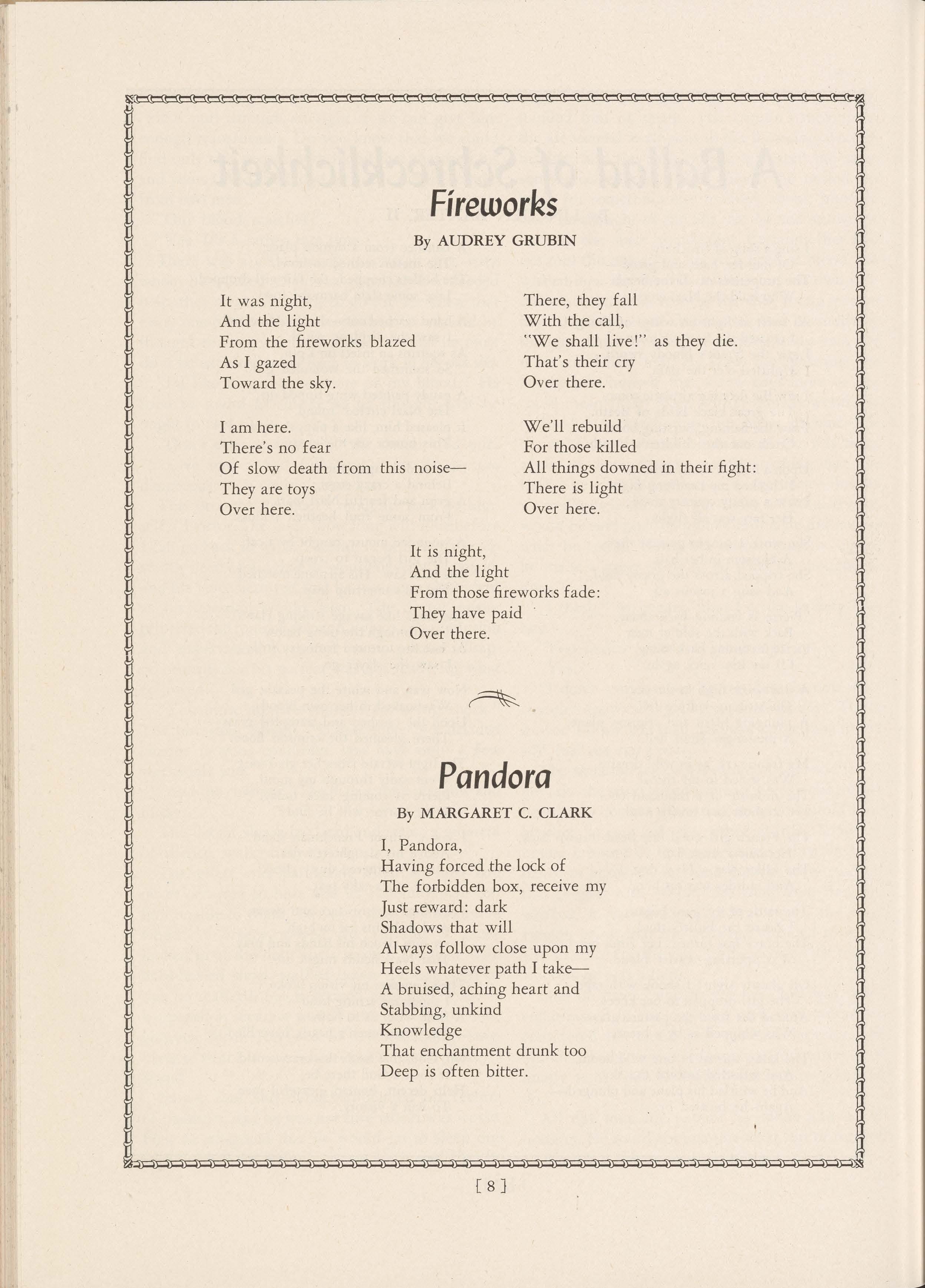
[ 8]
Moral
By FLETCHER STIERS, JR.
Fear not my love or hate, Nor believe the tales I relate Because they are untrue As is my lover, who is you.
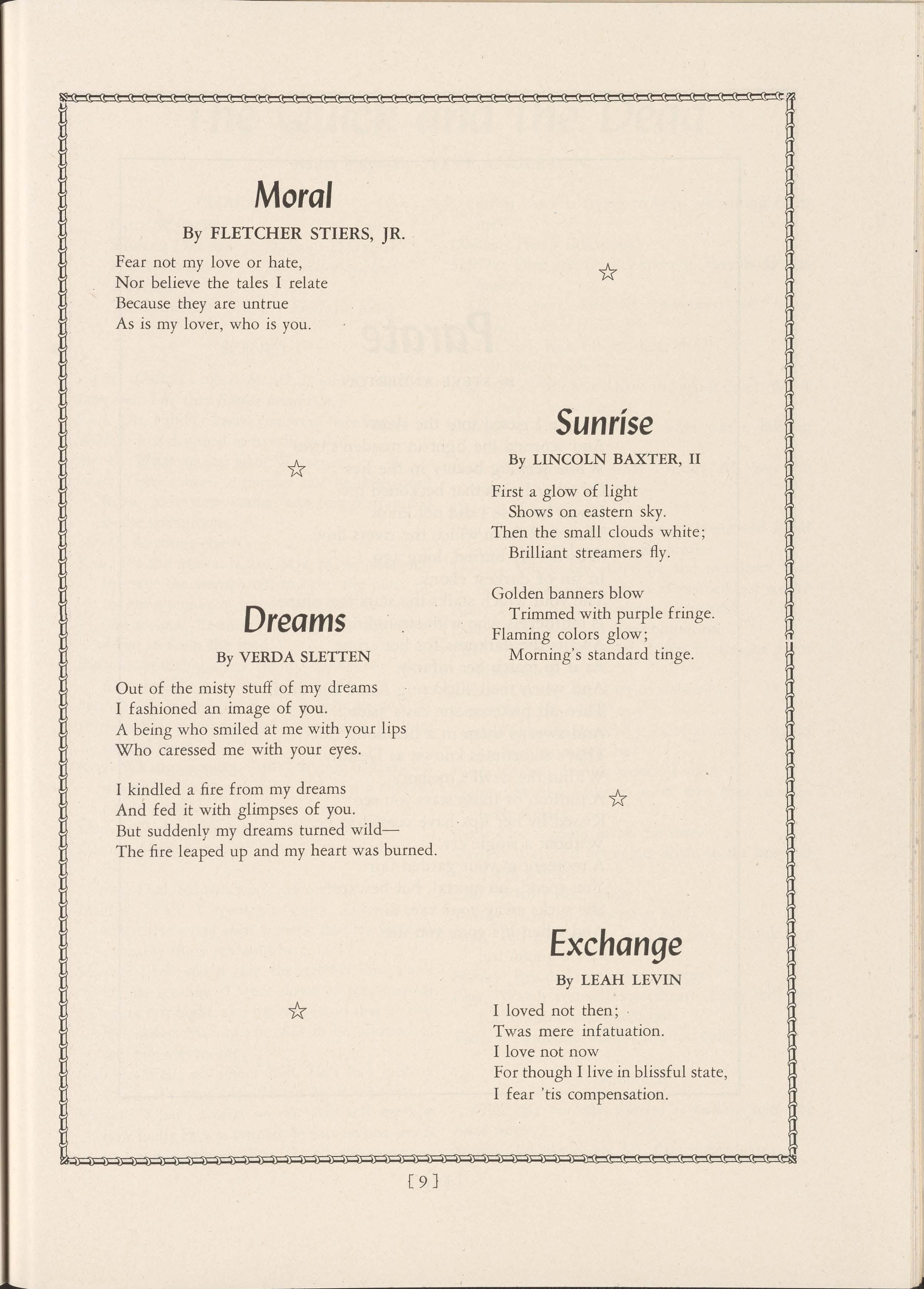
Dreams
By VERDA SLETTEN
Out of the misty stuff of my dreams I fashioned an image of you. A being who smiled at me with your lips Who caressed me with your eyes.
I kindled a fire from my dreams And fed it with glimpses of you. But sudden! y my dreams turned wildThe fire leaped up and my heart was burned.
Sunrise
By LINCOLN BAXTER, II
First a glow of light Shows on eastern sky. Then the small clouds white; Brilliant streamers fly.
Golden banners blow Trimmed with purple fringe. Flaming colors glow; Morning ' s standard tinge.
Exchange
By LEAH LEVIN
I loved not then; Twas mere infatuation. I love not now For though I live in blissful state, I fear 'tis compensation.

Parate·
By STEVE ANDERTON
If once I gazed into the skies
And scorned the light in maiden's eyes
While seeking beauty in the lies Of other lights that beckoned me, It was because I did not know That well from which the rivers flow Was deeply buried, long ago, In sin of darkest ebony. The void which stalks the stars that shine Is murderess who with st~angling vine A waits the darkness for her crime
As if to match her infamy. And when their flickering flame has died, Then all pretense she casts aside, And sweeps them in a headlong tide: That's sometimes known as Destiny. Within the devil's memory
A million of those stars you see Kissed by her lips have ceased to be, Without a single cry.
A moment in your garden fair You spend, oh mortal, but beware! She sucks away your very air And when it's gone you die! [ 10]
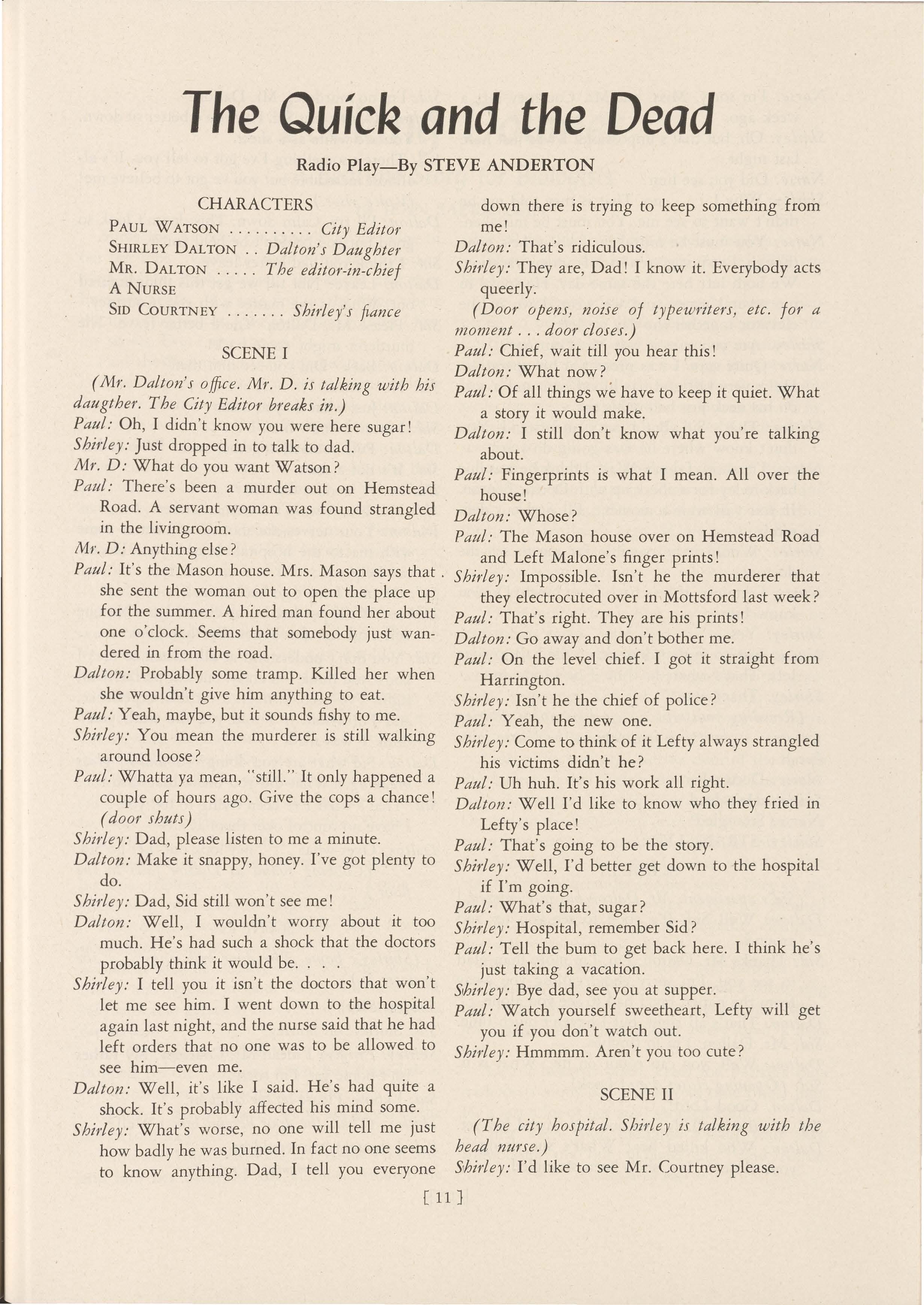
TheQuickand the Dead
Radio Play-By STEVE ANDERTON
CHARACTERS
PAUL WATSON City Editor
SHIRLEY DALTON Dalton ' s Daughter
MR. DALTON The editor-in-chief A NURSE Sm COURTNEY Shirley's fiance
SCENE I
( Mr. Dalton ' s office. Mr. D. is talking with his daugther. The City Editor breaks in.)
Paul: Oh, I didn't know you were here sugar!
Shirley: Just dropped in to talk to dad.
Mr. D: What do you want Watson?
Patti: There ' s been a murder out on Hemstead Road. A servant woman was found strangled in the livingroom.
Mr. D: Anything else?
Paul: It's the Mason house Mrs. Mason says that she sent the woman out to open the place up for the summer. A hired man found her about one o'clock. Seems that somebody just wandered in from the road.
Dalton: Probably some tramp. Killed her when she wouldn't give him anything to eat.
Paul: Yeah, maybe, but it sounds fishy to me .
Shirl ey: You mean the murderer is still walking around loose?
Paul: Whatta ya mean, "still." It only happened a couple of hours ago. Give the cops a chance!
( door shuts)
Shirl ey: Dad, please listen to me a minute.
Dalton: Make it snappy, honey. I've got plenty to do
Shirley: Dad, Sid still won't see me!
D alton: Well, I wouldn't worry about it too much. He's had such a shock that the doctors probably think it would be. . . . ,
Shirl ey: I tell you it isn't the doctors that w~n t let me see him. I went down to the hospital again last night, and the nurse said that he had left orders that no one was to be allowed to see him-even me.
Dalton: Well, it's like I said. He's had quite a shock. It's probably affected hi~ mind som:.
Shirley: What's worse, no one will tell me Just how badly he was burned. In fact no one seems to know anything. Dad, I tell you everyone
down there is trying to keep something from me!
Dalton: That's ridiculous.
Shirley: They are, Dad! I know it. Everybody acts queerly.
(Door opens, noise of typewriters , etc. for a moment ... door closes.)
Patti: Chief, wait till you hear this!
Dalton: What now?
Paul: Of all things we have to keep it quiet. What a story it would make.
Dalton: I still don't know what you're talking about.
Paul: Fingerprints is what I mean. All over the house!
Dalton: Whose?
Patti: The Mason house over on Hemstead Road and Left Malone's finger prints!
Shirley: Impossible. Isn't he the murderer that they electrocuted over in Mottsford last week?
Pau/: That's right. They are his prints!
Dalton: Go away and don't bother me.
Paul: On the level chief. I got it straight from Harrington.
Shirley: Isn't he the chief of police?
Paul: Yeah, the new one.
Shirley: Come to think of it Lefty always strangled his victims dido' t he?
Paul: Uh huh. It's his work all right.
Dalton: Well I'd like to know who they fried in Lefty's place!
Paul: That's going to be the story.
Shirley: Well, I'd better get down to the hospital if I'm going.
Paul: What's that, sugar?
Shirley: Hospital, remember Sid?
Paul: Tell the bum to get back here. I think he ' s just taking a vacation.
S,hirley: Bye dad, see you at supper.
Paul: Watch yourself sweetheart, Lefty will get you if you don't watch out.
Shirley: Hmmmm. Aren't you too cute?
SCENE II
(The city hospital. Shirley is talking with the head nurse.)
Srhirley: I'd like to see Mr. Courtney please.
[ 11]
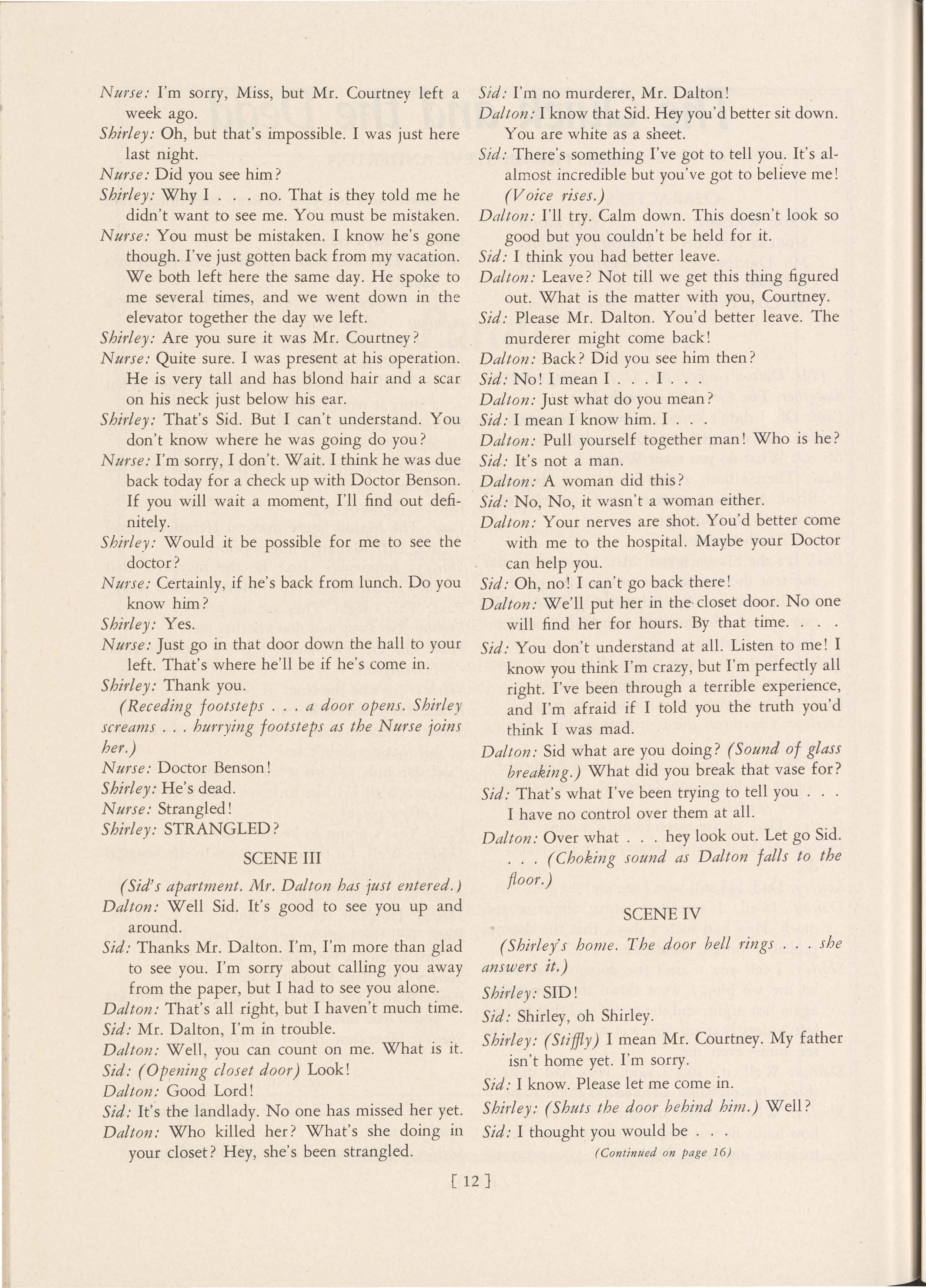
Nurse: I'm sorry, Miss, but Mr. Courtney left a week ago.
Shirley: Oh, but that's impossible. I was just here last night.
Nurse: Did you see him?
Shirley: Why I ... no. That is they told me he didn't want to see me. You must be mistaken.
Nurse: You must be mistaken. I know he's gone though. I've just gotten back from my vacation. We both left here the same day. He spoke to me several times, and we went down in the elevator together the day we left.
Shirley: Are you sure it was Mr. Courtney?
Nurse: Quite sure. I was present at his operation. He is very tall and has blond hair and a scar on his neck just below his ear.
Shirley: That's Sid. But I can't understand. You don't know where he was going do you?
Nurse: I'm sorry, I don't. Wait. I think he was due back today for a check up with Doctor Benson. If you will wait a moment, I'll find out definitely.
Shirley: Would it be possible for me to see the doctor?
Nurse: Certainly, if he's back from lunch. Do you know him?
Shirley: Yes.
Nurse: Just go in that door down the hall to your left. That's where he'll be if he's come in.
Shirley: Thank you.
(Receding footsteps a door opens. Shirley screams ... hurrying footsteps as the Nurse joins her.)
Nurse: Doctor Benson!
Shirley: He's dead.
Nurse: Strangled!
Shirley: STRANGLED?
SCENE III
(Sid's apartment. Mr. Dalton has just entered.)
Dalton: Well Sid. It's good to see you up and around.
Sid: Thanks Mr. Dalton. I'm, I'm more than glad to see you. I'm sorry about calling you away from the paper, but I had to see you alone.
Dalton: That's all right, but I haven't much time.
Sid: Mr. Dalton, I'm in trouble.
Dalton: Well, you can count on me. What is it.
Sid: (Opening closet door) Look!
Dalton: Good Lord!
Sid: It's the landlady. No one has missed her yet.
Dalton: Who killed her? What's she doing in your closet? Hey, she's been strangled.
Sid: I'm no murderer, Mr. Dalton!
Dalton: I know that Sid. Hey you'd better sit down. You are white as a sheet.
Sid: There's something I've got to tell you. It's alalmost incredible but you've got to believe me! (Voice rises.)
Dalton: I'll try. Calm down. This doesn't look so good but you couldn't be held for it.
Sid: I think you had better leave.
Dalton: Leave? Not till we get this thing figured out. What is the matter with you, Courtney.
Sid: Please Mr. Dalton. You'd better leave. The murderer might come back!
Dalton: Back? Did you see him then?
Sid: No! I mean I I
Dalton: Just what do you mean?
Sid: I mean I°know him. I
Dalton: Pull yourself together man! Who is he?
Sid: It's not a man.
Dalton: A woman did this?
Sid: No, No, it wasn't a woman either.
Dalton: Your nerves are shot. You'd better come with me to the hospital. Maybe your Doctor can help you.
Sid: Oh, no! I can't go back there!
Dalton: We'll put her in the closet door. No one will find her for hours. By that time.
Sid: You don't understand at all. Listen to me! I know you think I'm crazy, but I'm perfectly all right. I've been through a terrible experience, and I'm afraid if I told you the truth you'd think I was mad.
Dalton: Sid what are you doing? (Sound of glass breaking.) What did you break that vase for?
Sid: That's what I've been trying to tell you I have no control over them at all.
Dalton: Over what hey look out. Let go Sid (Choking sound as Dalton falls to the floor.)
SCENE IV
(Shirley's home. The door bell rings she answers it.)
Shirley: SID!
Sid: Shirley, oh Shirley.
Shirley: (Stiffiy) I mean Mr. Courtney. My father isn't home yet. I'm sorry.
Sid: I know. Please let me come in.
Shirley: (Shuts the door behind him.) Well?
Sid: I thought you would be (Continued on page 16)
[ 12]
LookingDowner A BedtimeStory for Biologists
By JEAN SAPERSTEIN
Annie the Amoeba ran quickly to the edge of her test tube. "Come on over ih my test tube and play awhile , Paul, please," she called and then hummed gently, "I wanta flow to the ridge where the tube commences, gaze at the moon until I lose my senses . Don't stop me up!"
Paul the Parameciun had stopped at this point and was eagerly listening to every word his little playmate Annie was saying. ' Tll ask Mom if I can come over," he called as he flowed away as fast as his little cilia would take him. Down to the other end of the test tube he went, whistling happily, with his oral groove in the air as if he didn't have a care in the world "Hey, Mom, can I go over to Annie the Amoeba's house? Please say yes, Mom," he pleaded. "The bacteria triplets are going to raid us today and I've gotta ' help Annie."
Paul's mother nodded her head in consent, but paid not the least bit of attention to her son. She went on calmly combing her long cilia. She was very vain about her cilia-it just wouldn't curl without attention
Paul paddled away happily in the direction of Annie's tube. Suddenly whom should he bump into but Edward the Euglena. "Well if it isn't Eddie! You old Proto zoa. How are ya ' <loin'?"
All this time Eddie was paddling along the test tube beside Paul, whisking his flagella from sid:= to side, but never saying a word. "Where ya' gain', Paul?"' he finally said.
"Over to Annie's to defend the club against the bacteria triplets," was the answer_ "Come on , we'll need you. They' re tough all right."
Now if there was anything Eddie liked, it was a good fight. Yes, he was the first one to start an argument and he usually won, too, the way he threw his flagella around. "Sure, I'll help," he said with that gleam in his eye that only a euglena can have.
As they approached Annie's tube the animals stopped, for there, coming down their Petri dish in full force were the bacteria triplets.
"Hurry," shouted Paul, "we've got to get to the hut before they do."
Eddie and Paul sped along into Annie's test tube and into her backyard just in time. Around the
edge of the tube crept the bacteria triplets. "Quick, into the hut," cried Annie. "We can hold out forever in there."
The bacteria triplets, although plants, happened to be motile · little children. Caroline the Cocci had a little trouble because her capsule kept dragging, but her brothers made up the speed she lost. Sam the Spirillurn and Bobby the Baccilus were the mean members of the threesome. Why, sometime the protozoa almost liked Caroline, she seemed so well rounded.
Inside the hut the protozoa watched the slow advance o.f the bacteria. They crept closer and closer . Any minute they would begin bombarding them with hardened arga. While waiting for the siege to begin, the protozoa were talking.
"Why wasn't Sammy in school last week?" asked Annie.
"O his mother ma~e him stay home because he had spores again," said Paul.
"Again? .He's always got them. Either that or something wrong with his metachromatic granules , " responded Edward, "but what do you expect? Their mother gives them nothing but nutrient broth for lunch every day."
Barn! a piece of arga hit the door of the hut as the triplets started their bombardment. The protozoan club responded with some lumps of sediment. On and on the siege went until finally the bacteria started retreating. Sammy the Spirillum and Bobby the Baccillus ran back and hid, but poor Caroline was forced to surrender for her side. "They've got to pay the penalty, they've got to pay it!" shouted Annie as she flowed around excitedly, changing her shape at every move
"What'll we make 'em do?" said Edward.
"I know," said Annie. "Let's make them sing like Percy the Porifera, the super crooner. Why, my vacuole just skips a beat every time I hear him."
"O, for heavens sakes, Percy the Porifera puts trichocysts in my ectoplasm every time I hear him. He's just a lot of hot air," shouted Paul.
"Just keep your thoughts within your own endoplasm, my fine paramecium," said Annie.
(Continu ed o n p age 16)
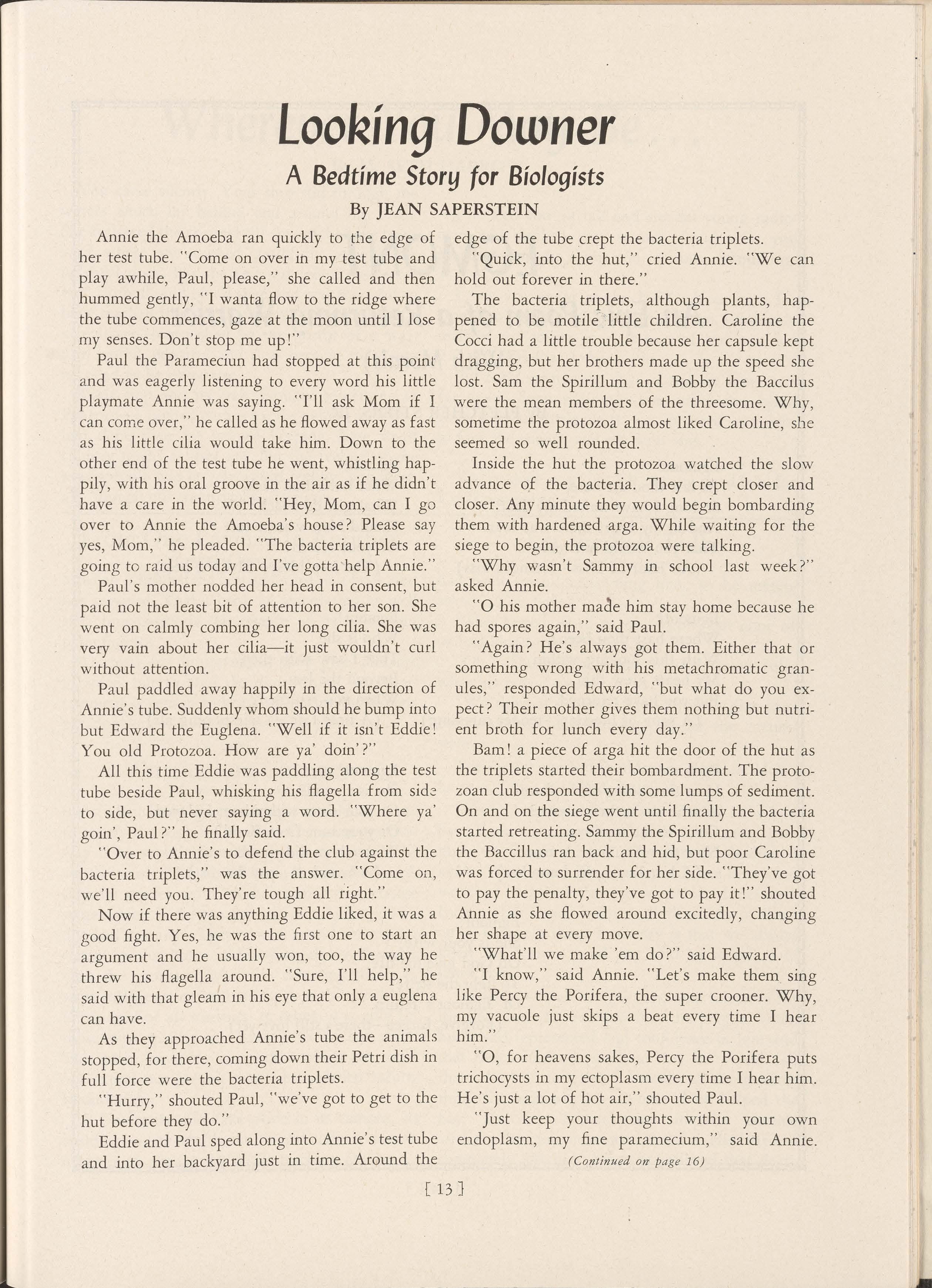
[ 13]
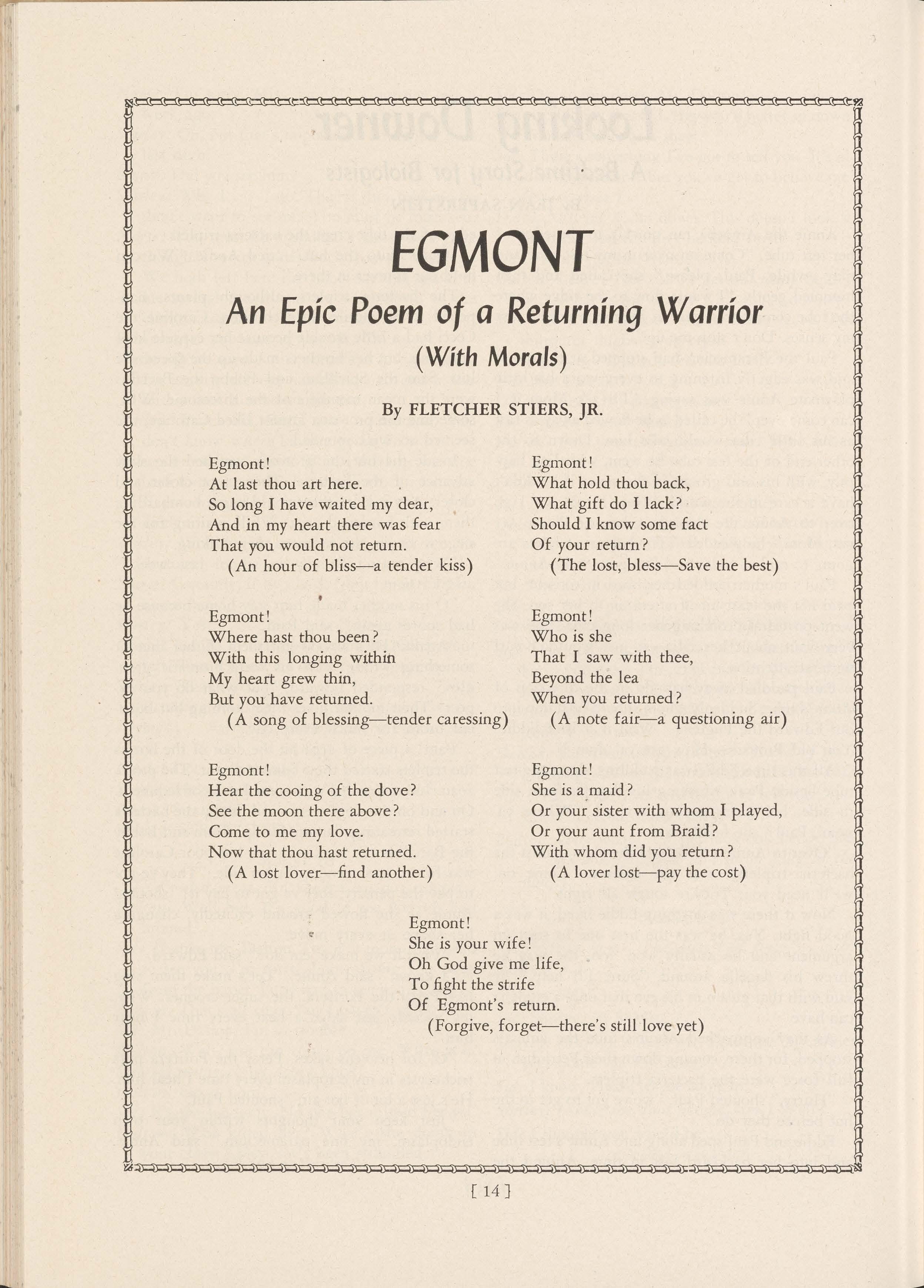
EGMONT An EpicPoemof a ReturningWarrior
(With Morals)
By FLETCHER STIERS, JR.
Egmont! At last thou art here. So long I have waited my dear, And in my heart there was fear That you would not return.
( An hour of bliss-a tender kiss)
Egmont! Where hast thou been ?
With this longing within My heart grew thin, But you have returned.
( A song of blessing-tender caressing)
Egmont!
Hear the cooing of the dove? See the moon there above? Come to me my love. Now that thou hast returned.
( A lost lover-find another) "
Egmont! She is your wife!
Egmont! What hold thou back, What gift do I lack? Should I know some fact Of your return ?
(The lost, bless-Save the best)
Egmont! Who is she That I saw with thee, Beyond the lea When you returned ? ( A note fair-a questioning air)
Egmont! She is a maid?
Or your sister with whom I played, Or your aunt from Braid? With whom did you return?
( A lover lost-pay the cost)
Oh God give me life, To fight the strife Of Egmont' s return.
(Forgive, forget-there's still love yet)
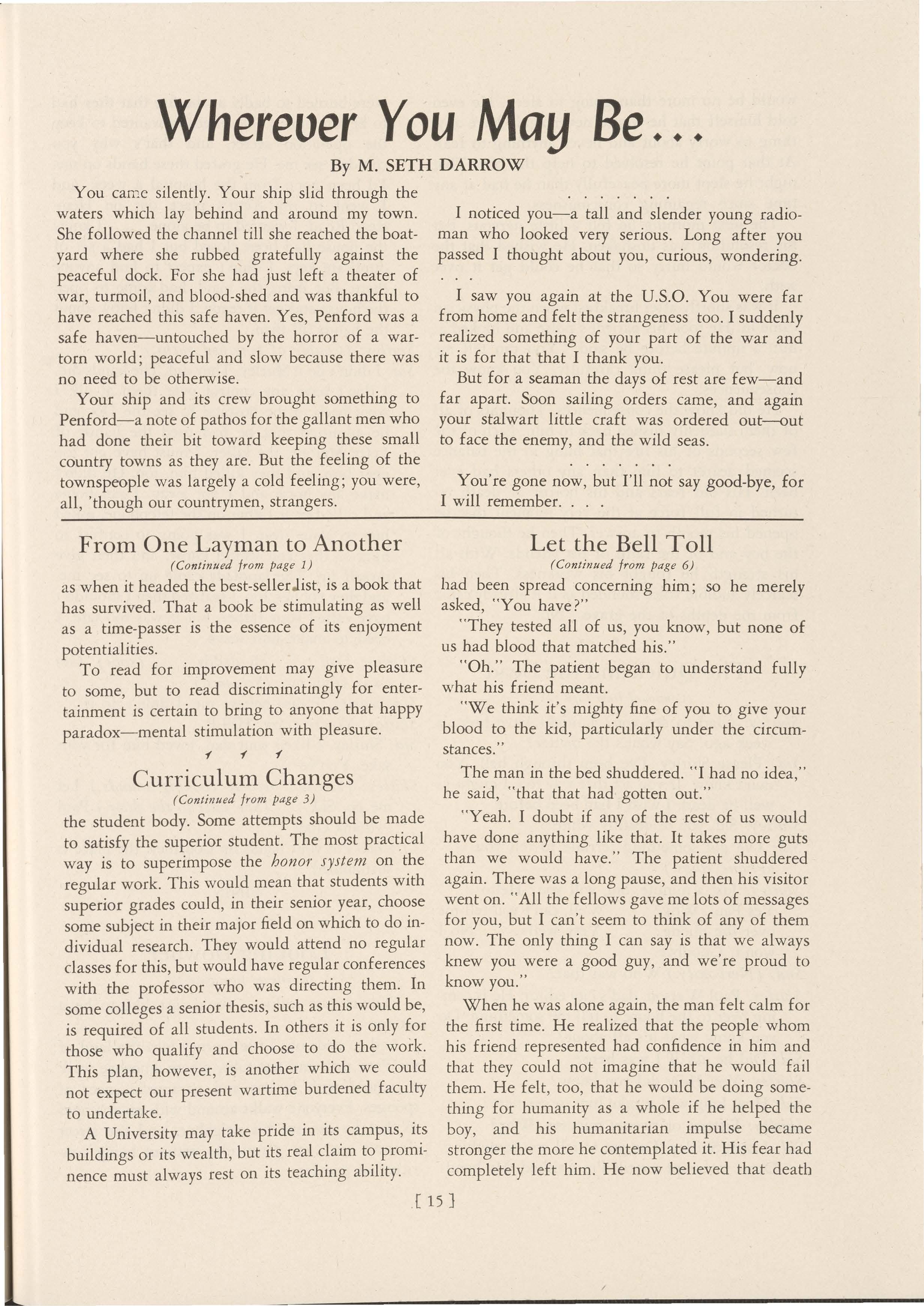
WhereoerYouMay Be
By M. SETH DARROW
You can,c silently. Your ship slid through the waters which lay behind and around my town. She followed the channel till she reached the boatyard where she rubbed gratefully against the peaceful dock. For she had just left a theater of war, turmoil, and blood-shed and was thankful to have reached this safe haven. Yes, Penford was a safe haven-untouched by the horror of a wartorn world; peaceful and slow because there was no need to be otherwise.
Your ship and its crew brought something to Penford-a note of pathos for the gallant men who had done their bit toward keeping these small country towns as they are. But the feeling of the townspeople was largely a cold feeling; you were, all, 'though our countrymen, strangers.
From One Layman to Another
(Continued from page 1) as when it headed the best-seller.list, is a book that has survived. That a book be stimulating as well as a time-passer is the essence of its enjoyment potentialities.
To read for improvement may give pleasure to some, but to read discriminatingly for entertainment is certain to bring to anyone that happy paradox--mental stimulation with pleasure.
f f f
Curriculum Changes
(Continued from page 3) the student body. Some attempts should be made to satisfy the superior student. The most pradical way is to superimpose the honor system on the regular work. This would mean that students with superior grades could, in their senior year, choose some subject in their major field on which to do individual research. They would attend no regular classes for this, but would have regular conferences with the professor who was directing them. In some colleges a senior thesis, such as this would be, is required of all students. In others it is only ~or those who qualify and choose to do the work. This plan, however, is another which we could not expect our present wartime burdened faculty to undertake.
A University may take pride in its campus, its buildings or its wealth, but its real claim to prominence must always rest on its teaching ability.
I noticed you-a tall and slender young radioman who looked very serious. Long after you passed I thought about you, curious, wondering.
I saw you again at the U.S.O. You were far from home and felt the strangeness too. I suddenly realized something of your part of the war and it is for that that I thank you.
But for a seaman the days of rest are few-and far apart. Soon sailing orders came, and again your stalwart little craft was ordered out--out to face the enemy, and the wild seas.
You're gone now, but I'll not say good-bye, for I will remember. . . .
Let
the Bell Toll
(Continued from page 6) had been spread concerning him; so he merely asked, "You have?"
"They tested all of us, you know, but none of us had blood that matched his."
"Oh." The patient began to understand fully what his friend meant.
"We think it's mighty fine of you to give your blood to the kid, particularly under the circumstances.''
The man in the bed shuddered. "I had no idea," he said, "that that had gotten out."
"Yeah. I doubt if any of the rest of us would have done anything like that. It takes more guts than we would have." The patient shuddered again. There was a long pause, and then his visitor went on. "All the fellows gave me lots of messages for you, but I can't seem to think of any of them now. The only thing I can say is that we always knew you were a good guy, and we're proud to know you."
When he was alone again, the man felt calm for the first time. He realized that the people whom his friend represented had confidence in him and that they could not imagine that he would fail them. He felt, too, that he would be doing something for humanity as a whole if he helped the boy, and his humanitarian impulse became stronger the more he contemplated it. His fear had completely left him. He now believed that death
[ 15}
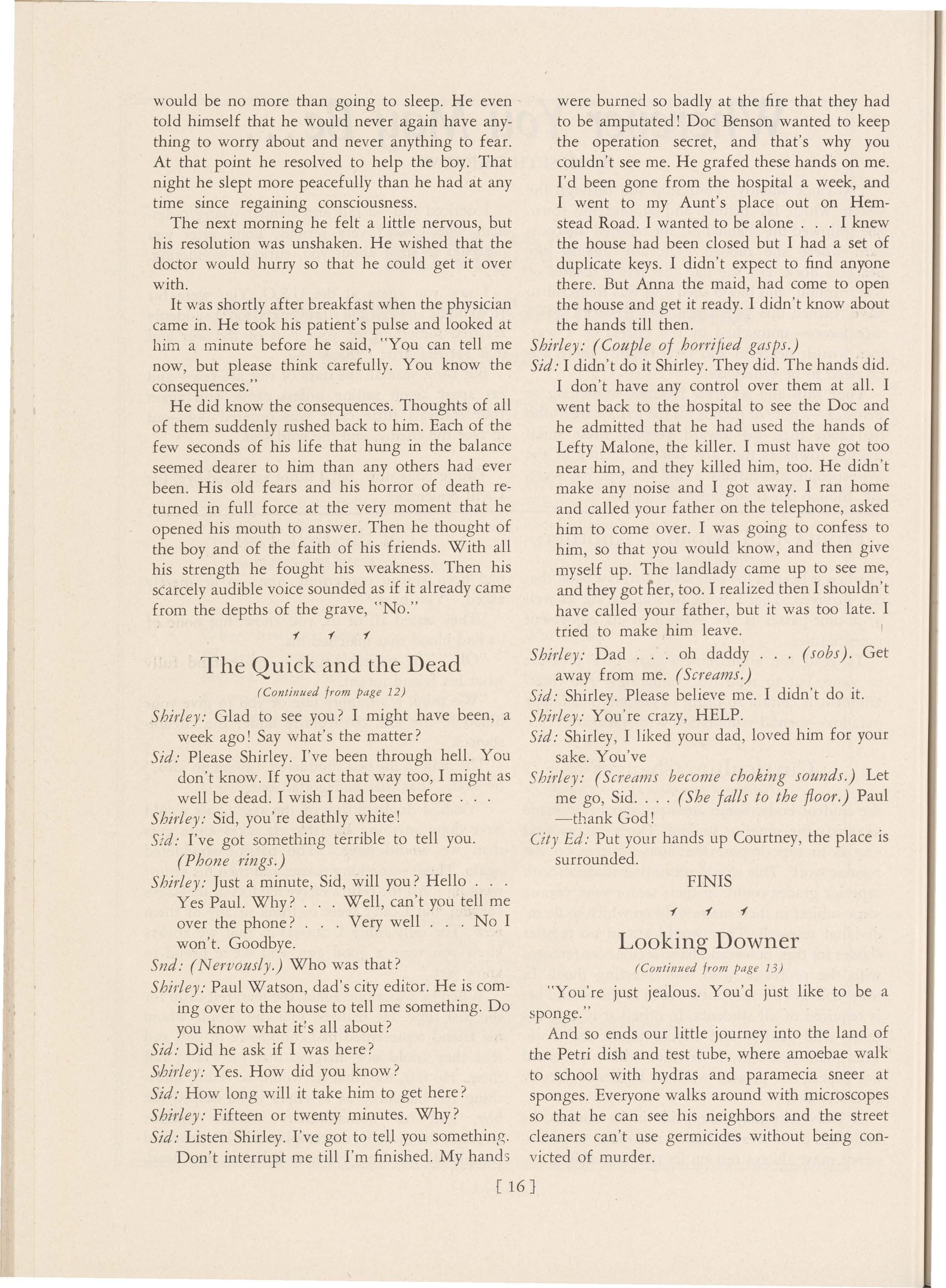
would be no more than going to sleep. He even told himself that he would never again have anything to worry about and never anything to fear. At that point he resolved to help the boy. That night he slept more peacefully than he had at any time since regaining consciousness.
The next morning he felt a little nervous, but his resolution was unshaken. He wished that the doctor would hurry so that he could get it over with.
It was shortly after breakfast when the physician came in. He took his patient's pulse and looked at him a minute before he said, "You can tell me now, but please think carefully. You know the consequences.''
He did know the consequences. Thoughts of all of them suddenly rushed back to him. Each of the few seconds of his life that hung in the balance seemed dearer to him than any others had ever been. His old fears and his horror of death returned in full force at the very moment that he opened his mouth to answer. Then he thought of the boy and of the faith of his friends. With all his strength he fought his weakness. Then his scarcely audible voice sounded as if it already came from the depths of the grave, "No." f f f
The Quick and the Dead
(Continued from page 12)
Shirley: Glad to see you? I might have been, a week ago! Say what's the matter?
Sid: Please Shirley. I've been through hell. You don't know. If you act that way too, I might as well be dead. I wish I had been before . .
Shirley: Sid, you' re deathly white!
Sid: I've got something terrible to tell you. (Phone rings.)
Shirley: Just a minute, Sid, will you? Hello Yes Paul. Why? . Well, can't you tell me over the phone? . . . Very well . . . No I won't. Goodbye.
Snd: (Nervously.) Who was that?
Shirley: Paul Watson, dad's city editor. He is coming over to the house to tell me something. Do you know what it's all about?
Sid: Did he ask if I was here?
Shirley: Yes. How did you know?
Sid: How long will it take him to get here?
Shirley: Fifteen or twenty minutes. Why?
Sid: Listen Shirley. I've got to tel.I you something. Don't interrupt me till I'm finished. My hands
[ 16]
were burned so badly at the fire that they had to be amputated! Doc Benson wanted to keep the operation secret, and that's why you couldn't see me. He grafed these hands on me. I'd been gone from the hospital a week, and I went to my Aunt's place out on Hemstead Road. I wanted to be alone I knew the house had been closed but I had a set of duplicate keys. I didn't expect to find anyone there. But Anna the maid, had come to open the house and get it ready. I didn't know about the hands till then.
Shirley: (Couple of horrified gasps.)
Sid: I didn't do it Shirley. They did. The hands did. I don't have any control over them at all. I went back to the hospital to see the Doc and he admitted that he had used the hands of Lefty Malone, the killer. I must have got too near him, and they killed him, too. He didn't make any noise and I got away. I ran home and called your father on the telephone, asked him to come over. I was going to con£ess to him, so that you would know, and then give myself up. The landlady came up to see me, and they got her, too. I realized then I shouldn't have called your father, but it was too late. I tried to make him leave. '
Shirley: Dad ... oh daddy ... (sobs). Get away from me. (Screams'.)
Sid: Shirley. Please believe me. I didn't do it.
Shirley: You're crazy, HELP.
Sid: Shirley, I liked your dad, loved him for your sake. You've
Shirley: (Screctms become choking sounds.) Let me go, Sid .... (She falls to the floor.) Paul -thank God!
City Ed: Put your hands up Courtney, the place is surrounded.
FINIS
f f f
Looking Downer
(Continued from page 13)
"You' re just jealous. You'd just like to be a sponge."
And so ends our little journey into the land of the Petri dish and test tube, where amoebae walk to school with hydras and paramecia sneer at sponges. Everyone walks around with microscopes so that he can see his neighbors and the street cleaners can't use germicides without being convicted of murder.

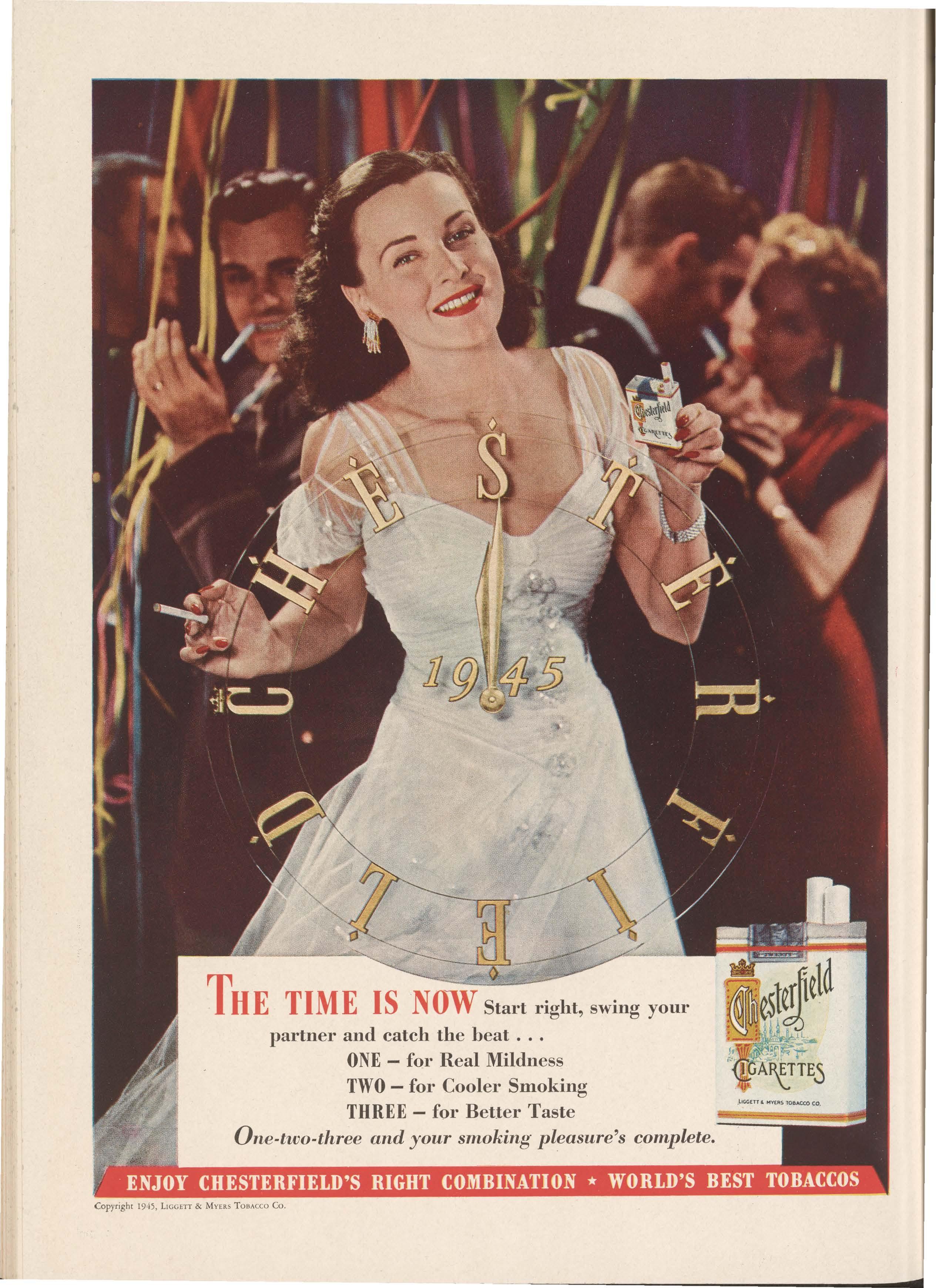
TuETIMEIS NOWStart right, swing your partner and catch the heat
ONE- for Real Mildne s s
TWO- for Cooler Smoking
THREE- for Better Taste
One-two-three and your smoking pleasure's complete.
